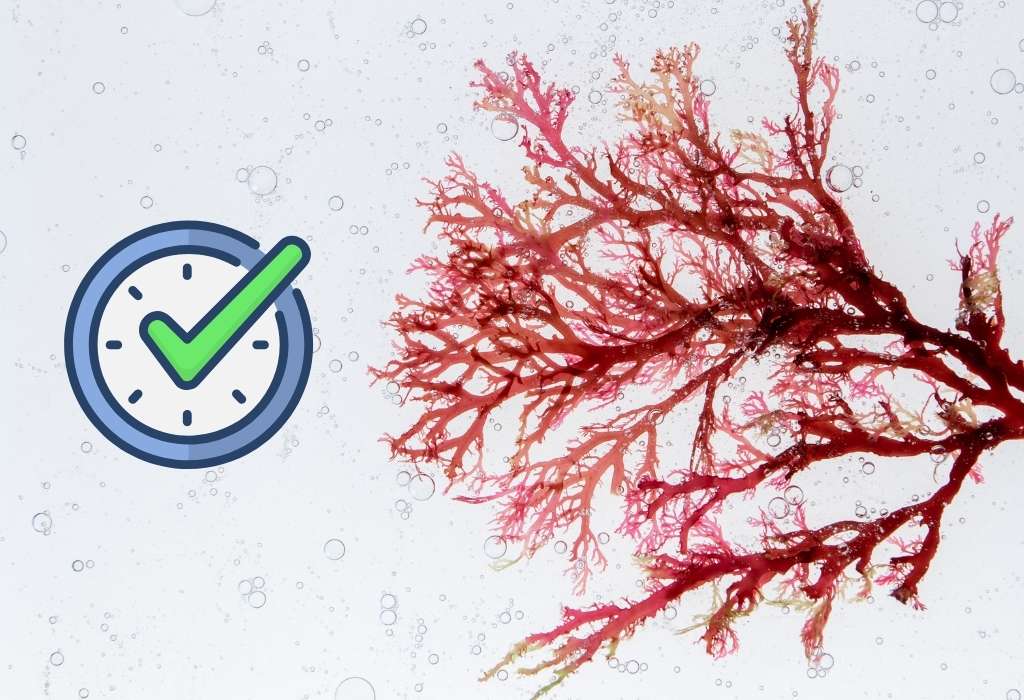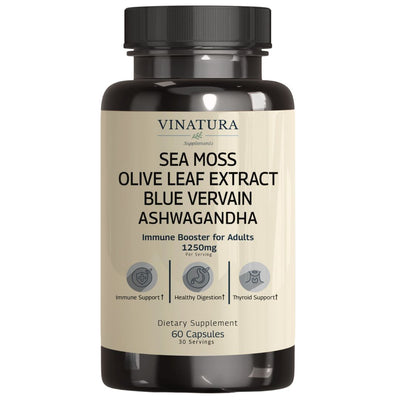
What Is The Best Time To Take Sea Moss?
The two golden times of the day to take sea moss are in the morning and evening. You can choose the most suitable time depending on your goals, lifestyle, and body condition. Let's take a closer look at sea moss, including the advantages and disadvantages of using this seaweed at each time of the day.
Before exploring further, please read the disclaimer located at the end of this webpage.
Key Takeaways
- Sea moss is a renowned superfood, exceptionally rich in natural nutrients. It is, therefore, known as a golden key to improving health.
- The best time to take sea moss can be in the morning or evening, each offering different benefits and some drawbacks for health.
- It is advisable to use sea moss according to the dosage recommended by your doctor to achieve the best results.
What is True Sea Moss?

True Sea Moss is a type of sea moss with high quality and nutrient content, including vitamins and minerals such as iodine, calcium, potassium, natural magnesium, iron, antioxidants, omega fatty acids, and other essential acids. For this reason, True Sea Moss is often processed naturally to preserve its valuable nutrients, helping improve overall health optimally.
Benefits of Sea Moss
Potential health benefits of sea moss include:
- Antioxidant properties: Research indicates that sea moss can protect cells from damage caused by oxidative stress, thereby enhancing immune function and neutralizing harmful free radicals. [1]
- Improves Digestive Health: Due to its high fiber and vitamin content, sea moss significantly enhances digestive function by aiding nutrient absorption, boosting food breakdown, and preventing digestive disorders such as constipation. [2] [3]
- Supports Overall Health: The minerals and omega fatty acids found in sea moss play a crucial role in maintaining health balance, supporting cardiovascular health, and improving sleep.
How to Consume Sea Moss
Sea moss can be consumed in various popular forms, such as:
- Gel: You can enjoy sea moss gel directly or mix it with foods and beverages like smoothies, shakes, soups, or salads. The typical recommended dosage for this form is 1-2 tablespoons per day (equivalent to 10 grams) to achieve the best results.
- Capsules: This is the most common form of sea moss, which is often convenient and easy to use anytime, anywhere. The dosage for sea moss capsules should follow the manufacturer's instructions.
- Powder: Sea moss powder can be used in cooking recipes, smoothies, or daily beverages. For the recommended dosage, refer to the manufacturer's guidelines.
What is the Best Time to Take Sea Moss?

Morning and evening are the two best times to take sea moss. Depending on individual needs, goals, and health conditions, the choice of when to consume sea moss may vary:
Taking Sea Moss in the Morning:
- Advantages: Sea moss contains electrolytes, so adding these electrolytes in the morning can help energize the body, preventing sluggishness and fatigue. Additionally, the fiber in sea moss helps soothe the digestive system, setting the stage for a healthy digestive tract throughout the day, controlling hunger, and creating a feeling of fullness.
- Disadvantages: Consuming sea moss directly on an empty stomach in the morning might cause discomfort or mild nausea.
Taking Sea Moss in the Evening:
- Advantages: Consuming sea moss in the evening can enhance nutrient absorption as the body has time to rest and recover after a long day. The compounds in sea moss also help calm the body, reduce stress, and contribute to quality sleep.
- Disadvantages: However, for individuals sensitive to the components in sea moss, it might cause difficulty sleeping.
Optimal Time for Maximum Effect:
- If you often feel sluggish and lack the motivation and energy to start your day in the morning, then the best time to take sea moss is in the morning.
- If you frequently experience trouble sleeping at night or stress that affects your sleep, the best time to take sea moss is in the evening.
Frequently Asked Questions
Can sea moss be taken on an empty stomach?
The answer is no because taking sea moss directly on an empty stomach can cause discomfort and a gurgling feeling in the stomach. Combining sea moss with other foods or beverages or taking it after a meal is best to avoid these issues.
How long does it take for sea moss to work?
If you use sea moss consistently for 1-2 weeks, you may notice positive changes in your health and mood. However, depending on individual body characteristics, each person may require a different amount of time for sea moss to reach its full potential.
Can You Take Sea Moss Before Bed?
The answer is yes. Taking sea moss before bed will help the body absorb nutrients more effectively and recover after a long day.
Can Sea Moss Be Taken Daily?
You can use sea moss daily according to the manufacturer's recommended dosage or consult a qualified doctor for the appropriate dosage.
How to start taking sea moss
You can start with a small dosage to allow your body to get used to the taste of sea moss gradually, then gradually increase to the recommended dosage according to the usage guidelines, or consult a specialist.
How to store sea moss properly
For sea moss gel, you should store it in the refrigerator and use it within 2-3 weeks. For capsules and powder forms, please keep them in a dry place, away from moisture, and avoid direct exposure to sunlight.
Conclusion
Sea moss is a well-known food with many potential health benefits, and you can use sea moss in the morning or evening, depending on your goals and body condition. So why wait? Plan your specific goals now to choose the best time to take sea moss.
References
- [1] Author links open overlay panel Maha I. Alkhalaf Chemical composition, antioxidant, anti-inflammatory and cytotoxic effects of Chondrus crispus species of red algae: collected from the Red Sea along the shores ofJeddah city. DOI https://doi.org/10.1016/j.jksus.2020.10.007
- [2] Prebiotic effects of diet supplemented with the cultivated red seaweed Chondrus crispus or with fructo-oligo-saccharide on host immunity, colonic microbiota and gut microbial metabolites BMC Complement Altern Med. 2015; 15: 279. Published online 2015 Aug 14. doi: 10.1186/s12906-015-0802-5
- [3] Melatonin from Microorganisms, Algae, and Plants as Possible Alternatives to Synthetic Melatonin Metabolites. 2023 Jan; 13(1): 72. Published online 2023 Jan 2. doi: 10.3390/metabo13010072
Author

Product Disclaimer
Including an ingredient or study does not evaluate, endorse, or recommend any Vinatura product or any third-party product. Some ingredients discussed may not be used in any Vinatura product.
The content of the articles has not been evaluated by the Food and Drug Administration (FDA) and is not intended to promote or endorse any specific product. Any products sold on this website are not intended to diagnose, treat, cure, or prevent any disease.
Opinions and Endorsements
Any claims, statements, or opinions expressed in the articles are those of the author(s) and do not necessarily reflect the views or opinions of the manufacturers of the dietary supplement products. The products sold on this website are separate from the content of the articles and are not directly endorsed or associated with the information presented here.
Liability Disclaimer
The author(s) of the articles, website, and manufacturers of the dietary supplement products do not assume any liability for any potential consequences arising from the use of the information provided in the articles. Ingredient effects, dosages, and safety vary by individual, formulation, and context; some ingredients interact with medications or may be unsuitable during pregnancy or lactation. It is recommended that individuals consult with a qualified healthcare professional before making any dietary or lifestyle changes, including the use of dietary supplements.
Product Usage
Please refer to the product labels and packaging for specific usage instructions and guidelines for the dietary supplement products sold on this website.
Customer Support
For any concerns or questions regarding the dietary supplement products, please contact our customer support team, who will be more than happy to assist you.





Leave a Comment
Be the first to comment.
What do you think?